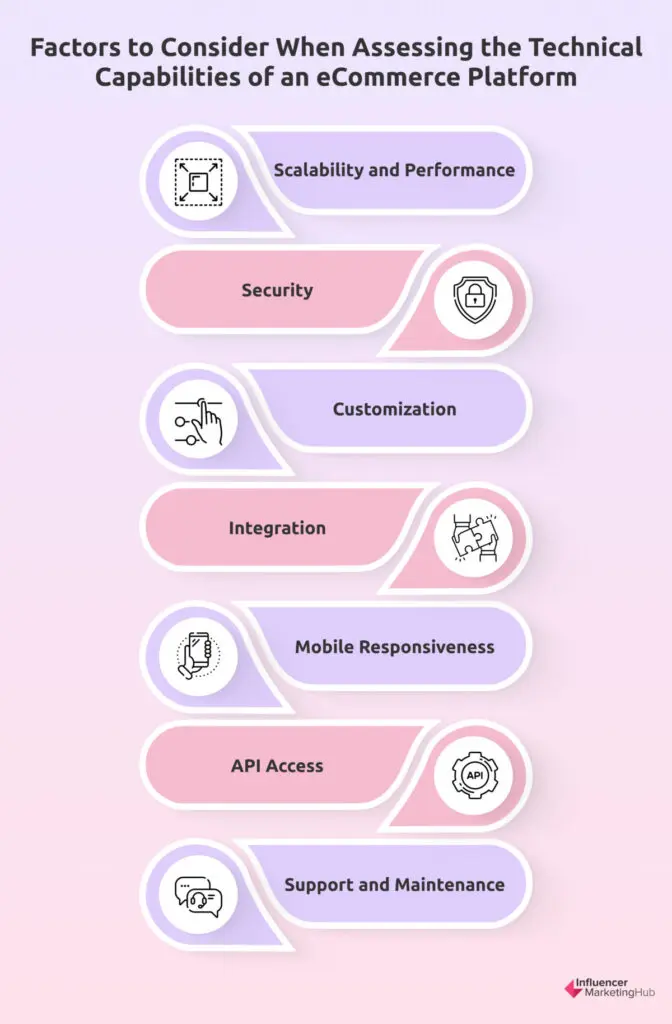Ecommerce platforms are digital systems that allow businesses to sell products and services online. These platforms serve as the backbone of an online store, providing the tools and functionality required to manage every aspect of the ecommerce process, from product listing to order fulfillment.
At their core, ecommerce platforms are designed to help businesses streamline and automate their ecommerce operations, while also providing a superior shopping experience for their customers. They offer a wide range of features, such as catalog management, shopping cart functionality, payment processing, shipping and tax calculation, and customer account management. Ecommerce platforms typically provide robust analytics and reporting tools that enable businesses to track key performance indicators (KPIs) like sales, conversion rates, and customer behavior. This data can then be used to optimize the customer experience, drive sales growth, and improve operational efficiency.
There are many different types of ecommerce platforms available on the market today, each with its own unique strengths and weaknesses. Some are designed specifically for small businesses and startups, while others are built for larger enterprises and high-volume online stores. When selecting an ecommerce platform, it is important to consider a wide range of factors, such as your business needs, budget, technical expertise, and the scalability of the platform.
Top Ecommerce Platforms for Your Enterprise:
1. Shopify

Shopify is a leading ecommerce platform that provides a fully hosted solution for enterprises of all sizes. It offers a wide range of features, including omnichannel commerce, powerful extensions, and 24/7 customer service. Shopify is an excellent choice for enterprises that require a reliable and easy-to-use ecommerce platform.
Pros | Cons |
Fully hosted eCommerce platform | Limited code and design flexibility |
Wide variety of basic features | Final cost difficult to calculate |
Numerous extensions and plugins | Limited B2B functionality |
Omnichannel commerce | |
Dedicated, 24/7, priority customer service | |
Support of multiple sites and locations | |
High stability and reliability |
2. Salesforce Commerce Cloud
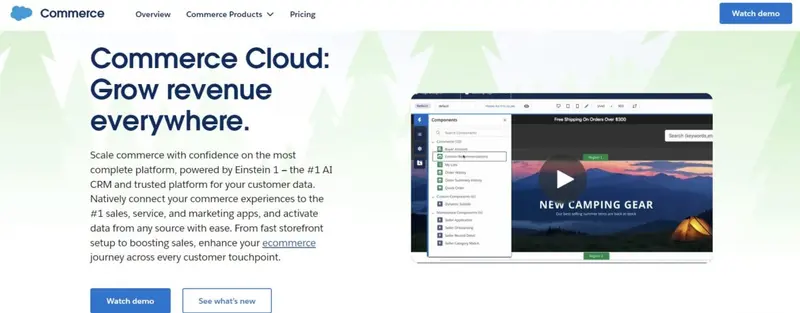
Salesforce is a well-known provider of CRM solutions and has created a powerful ecommerce platform called Salesforce Commerce Cloud. It offers omnichannel sales, customer behavior analytics, and personalized customer experiences. With Salesforce Commerce Cloud, enterprises can manage multiple sites and locations on a single platform.
Pros | Cons |
Omnichannel sales | Programming expertise required |
AI-based analytics and content personalization | Sales-based pricing may lead to a high final cost |
Wide variety of touchpoints within the system | Limited number of implementation agencies |
Single-platform management of globally distributed websites and locations | |
24/7 customer support | |
Unlimited customization | |
Easy integrations for the holistic eCommerce ecosystem |
3. Oracle Commerce
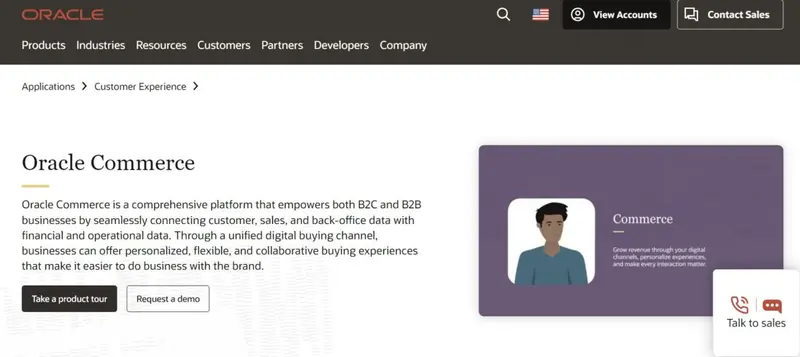
Oracle CX Commerce is a comprehensive ecommerce ecosystem that combines data from CRM and other enterprise-level software to create customer-specific shopping experiences. It offers cross-channel B2C and B2B sales, AI-based analytics and personalization, and consistent omnichannel content management.
Pros | Cons |
Comprehensive B2C and B2B enterprise eCommerce ecosystem | Shortage of experienced partners |
API-driven architecture that encourages unlimited flexibility and customization | Lack of eBay and Amazon integrations |
AI-based analytics and content personalization | High cost |
Integrated CPQ | No one-click checkout |
Consistent omnichannel content management | |
Efficient mobile application |
4. BigCommerce
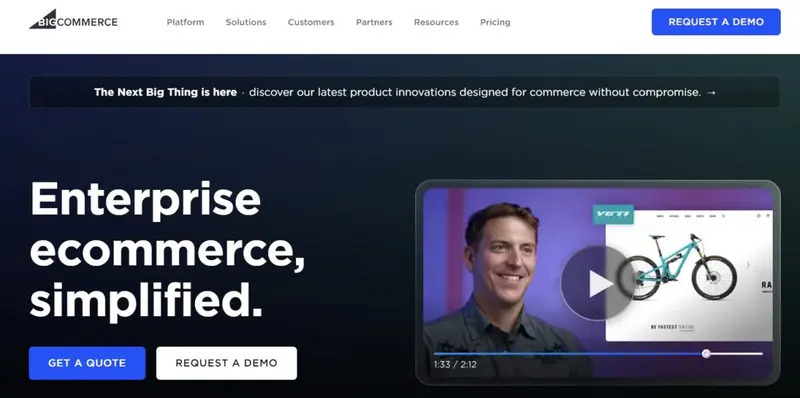
BigCommerce is a powerful solution for online commerce that allows enterprises to embrace a variety of business operations, both B2C and B2B. It offers headless commerce and content delivery, easy content management, and seamless integration with many applications, business software, and payment gateways.
Pros | Cons |
Headless commerce and content delivery | Development expertise required |
Intuitive WYSIWYG content management | Steep learning curve |
Reliability during periods of high traffic and high uptime | Pricing based on volume of sales |
Wide-ranging functionality for online sales, such as quote management, bulk pricing, etc. |
Note
WYSIWYG stands for “What You See Is What You Get”.
5. Magento Commerce

Magento Commerce is an all-in-one PaaS solution that facilitates online shopping. It offers omnichannel B2B and B2C commerce, personalized customer journeys, and a wide customer reach via various channels and touchpoints. Commerce Magento Commerce is an all-in-one PaaS solution that facilitates online shopping. It offers omnichannel B2B and B2C commerce, personalized customer journeys, and a wide customer reach via various channels and touchpoints.
Pros | Cons |
Open-source platform with a large community of developers | Hosting and maintenance costs can be high |
Highly customizable with a wide range of extensions and integrations available | Requires technical expertise to set up and maintain |
Supports both B2B and B2C eCommerce | Performance issues can arise as the platform scales up |
AI-driven analytics and personalization capabilities | Limited customer support |
Mobile-responsive design and progressive web applications | Requires a dedicated server for optimal performance |
Single platform for managing multiple sites and languages | Complexity of features can be overwhelming for smaller businesses |
6. Sitecore Experience Commerce

Sitecore Experience Commerce is a holistic end-to-end ecommerce ecosystem that combines capabilities for commerce, marketing, and content management. It offers AI-based content personalization, individually tailored shopping experiences, and consistent brand experiences across multiple channels.
Pros | Cons |
AI-based, best-in-class content personalization | Requires significant programming expertise |
Individually tailored shopping experiences | Steep learning curve for new users |
The support of omnichannel commerce and content delivery | Higher cost compared to other eCommerce platforms |
Single-platform content management | Limited number of implementation agencies |
Consistent brand experiences across channels, endpoints, and sites | |
Helpful community and customer support |
7. SAP Customer Experience
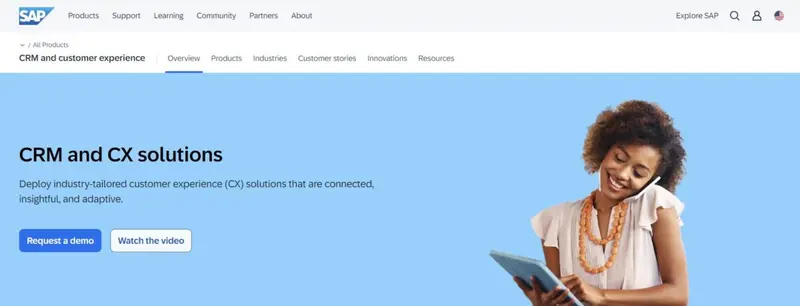
SAP Customer Experience (formerly SAP Hybris) is a powerful all-in-one solution for customer experience and relationship management. It offers versatile, powerful functionality, headless commerce, marketing automation, and customer service across all channels. SAP CX provides a 360-degree overview of buyer personas.
Pros | Cons |
All-in-one solution for eCommerce, CX, marketing, sales automation, and post-sales service | High cost of the platform |
Versatile, powerful functionality that increases the efficiency of all operations | Difficult development that requires technical expertise |
Headless commerce that extends customer reach | |
Marketing automation that goes hand in hand with the personalization of user experiences | |
Customer service that covers all history of user interaction with the brand | |
Safety and reliability that ensures proper handling of all customer data | |
The support of multiple sites, languages, locations, and currencies | |
On-premises and online hosting | |
Flexible and user-friendly management of user data |
Enterprise Ecommerce Platform Market Share in 2025
When it comes to choosing an ecommerce platform for an enterprise, market share can be a useful indicator of its suitability for the job.
Platform | Market Share |
Shopify | 28% |
Oracle Commerce | 2.72% |
Magento Commerce | 2.67% |
BigCommerce | 1.02% |
Salesforce Commerce Cloud | 0.55% |
SAP Customer Experience | 0.14% |
Site core Experience Commerce | 0.02% |
Let’s put this in perspective. In 2024, Shopify continues to be the leading player in the market, with a 28% share. Meanwhile, Oracle Commerce and Magento Commerce have a 2.72% and 2.67% share, respectively. BigCommerce follows closely behind with a 1.02% share, while Salesforce Commerce Cloud has a 0.55% share. Finally, SAP Customer Experience has a 0.14% share, while Sitecore Experience Commerce remains at 0.02%.
These market share statistics suggest that Shopify remains a popular choice for enterprise ecommerce, while other platforms like Oracle Commerce and Magento Commerce are also considered strong contenders. BigCommerce and Salesforce Commerce Cloud continue to compete for a share of the market, while SAP Customer Experience and Sitecore Experience Commerce are less widely adopted. Ultimately, the decision of which platform to use will depend on a range of factors specific to each enterprise's needs and goals.
How to choose the right ecommerce platform for your enterprise?
Choosing the right ecommerce platform for your enterprise is a complex and crucial decision that can have a significant impact on the success of your business. The right platform should offer scalability, flexibility, security, and a wide range of features that meet your business needs. In this section of the article, we will provide you with insights and guidelines to help you choose the right ecommerce platform for your enterprise.
1. Define your enterprise's objectives and needs
When it comes to selecting the right eCommerce platform for your enterprise, defining your objectives and needs is crucial. This involves identifying your business goals and determining the specific requirements that your platform must meet in order to achieve those goals.
To begin, start by defining your business objectives, which may include increasing sales, expanding your customer base, improving operational efficiency, or enhancing the overall customer experience. Once you have a clear understanding of your goals, it's time to look around at platforms and assess their technical capabilities.
2. Assess the Platform’s Technical Capabilities
Evaluating the technical capabilities of an eCommerce platform requires a thorough examination of the platform's architecture, features, and customization options to ensure that it aligns with your enterprise's technical needs and requirements.
To assess the technical capabilities of an eCommerce platform, you should consider the following factors:
1. Scalability and Performance: Your platform should be able to handle a high volume of traffic and transactions without compromising its speed and performance.
2. Security: The platform should provide robust security features to protect your enterprise and customers' sensitive data from cyber threats and hacking attempts.
3. Customization: The platform should offer flexible customization options that allow your developers to create custom features, integrations, and extensions that align with your enterprise's specific needs.
4. Integration: The platform should integrate seamlessly with other software and tools used by your enterprise, such as ERP, CRM, and marketing automation software.
5. Mobile Responsiveness: In today's mobile-first world, it's crucial that your platform provides a seamless mobile experience for your customers. This includes mobile-responsive design and native mobile app integration.
6. API Access: Your developers should have easy access to the platform's API, which allows them to customize and automate various aspects of your eCommerce operations.
7. Support and Maintenance: The platform provider should offer reliable support and maintenance services to ensure that your platform runs smoothly and is updated with the latest security patches and features.
3. Prioritize Customization and Flexibility
The ability to tailor the platform to your specific business needs and processes can greatly impact your bottom line and overall customer experience.
To ensure you choose an ecommerce platform with adequate customization and flexibility capabilities, consider the following factors:
1. Integration with existing systems: Look for a platform that seamlessly integrates with your existing systems and allows for customization and configuration based on your unique business requirements.
2. Code access: Determine the level of access to the platform’s code and APIs, as well as the extent to which you can customize the platform’s design, functionality, and user experience.
3. Third-party apps and plugins: Verify that the platform supports third-party apps and plugins, and determine the ease with which you can integrate them into your ecommerce solution.
4. Scalability: Choose a platform that can scale with your business needs and growth projections, allowing for additional customization and functionality as required.
5. User roles and permissions: Ensure that the platform provides a robust system for assigning user roles and permissions, so that you can maintain control over who has access to certain functions and features.
Importance of Vendor Support and Customer Service
In the highly competitive and rapidly evolving world of ecommerce, having a reliable and responsive support system can make all the difference in the success of your online business.
Here are some reasons why vendor support and customer service should be a top priority when choosing an ecommerce platform for your enterprise:
1. Technical Support and Troubleshooting:
A reliable and knowledgeable support team can provide technical assistance and troubleshooting when issues arise with your ecommerce platform. Whether it's a website outage, payment gateway issues or inventory management problems, having a dedicated support team that can quickly and efficiently resolve these issues is critical to the success of your business.
2. Platform Upgrades and Maintenance:
Ecommerce platforms require regular upgrades and maintenance to keep up with changing technology and security concerns. A vendor that provides ongoing updates, security patches, and maintenance support can ensure that your ecommerce platform runs smoothly, securely and without interruption.
3. Customization and Integration Support:
Every enterprise has unique business requirements, and a platform vendor that offers customization and integration support can help you tailor your ecommerce platform to meet your specific needs. Whether you require customized reporting, integration with a third-party software or the development of new features, having a vendor that can work with you to achieve your goals is crucial.
4. Training and Educational Resources:
Ecommerce platforms can be complex, and having access to training and educational resources can help you and your team get the most out of the platform. A vendor that provides onboarding, training webinars, and instructional videos can help ensure that you and your team are equipped to manage and operate the platform effectively.
5. 24/7 Customer Service:
Finally, a vendor that offers 24/7 customer service can provide peace of mind and ensure that any urgent issues that arise outside of regular business hours are quickly addressed. Having round-the-clock access to support and customer service can be a critical factor in maintaining the smooth operation of your online business.
Frequently Asked Questions
What is an ecommerce platform?
An ecommerce platform is a digital system that enables businesses to sell products and services online. It provides the necessary tools and functionality to manage every aspect of the ecommerce process, from product listing to order fulfillment.
What factors should I consider when selecting an ecommerce platform for my enterprise?
When selecting an ecommerce platform for your enterprise, it is important to consider a wide range of factors, such as your business needs, budget, technical expertise, and the scalability of the platform. You should also evaluate the platform's technical capabilities, customization options, and vendor support and customer service.
What are the top ecommerce platforms for enterprises in 2025?
The top ecommerce platforms for enterprises in 2025 include Shopify, Oracle Commerce, Magento Commerce, BigCommerce, Salesforce Commerce Cloud, SAP Customer Experience, and Sitecore Experience Commerce.
How do I assess the technical capabilities of an ecommerce platform?
To assess the technical capabilities of an ecommerce platform, you should consider factors such as scalability and performance, security, customization, integration, mobile responsiveness, API access, and support and maintenance.
How important is vendor support and customer service when choosing an ecommerce platform?
Vendor support and customer service are critical factors when choosing an ecommerce platform for your enterprise. A reliable and responsive support system can provide technical assistance, platform upgrades and maintenance, customization and integration support, and training and educational resources to ensure the smooth operation of your online business.


